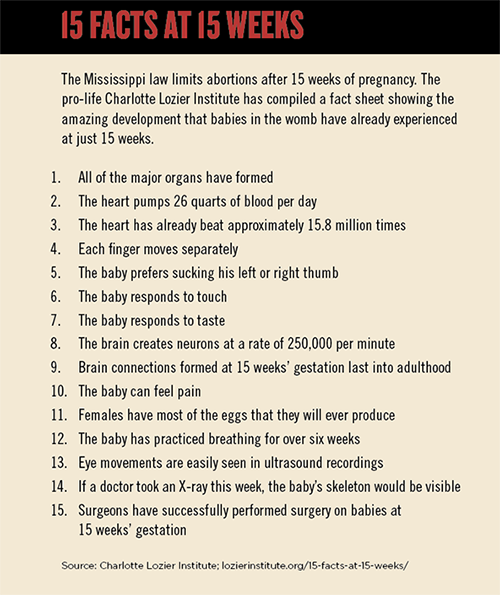For nearly 50 years, pro-life advocates have longed for the day when the U.S. Supreme Court would overturn Roe v. Wade, the landmark decision that legalized abortion across the United States. Almost two decades after Roe, the high court further defined abortion-on-demand as federal law in Planned Parenthood v. Casey.
Now, at long last, the court is considering a case that could see both of those bedrock cases overturned.
As of press time, oral arguments were scheduled for Dec. 1 in Dobbs v. Jackson Women’s Health Organization. At issue is a 2018 Mississippi law that would prohibit nearly all abortions after the 15th week of pregnancy. A federal district court blocked the law from being enforced, and the U.S. Court of Appeals for the 5th Circuit upheld that decision, prompting the state to appeal to the Supreme Court. Mississippi is asking the Supreme Court not only to uphold its law but also to overturn Roe and Casey.
The 1973 Roe decision legalized abortion performed before the age of viability—the point at which a fetus can survive outside its mother’s womb—which the court put at the third trimester of pregnancy. From the start, observers pointed out that the age of viability would change with medical advancements.
The 1992 Casey decision affirmed Roe but did away with the trimester framework, instead ruling that the government may not put an “undue burden” on a woman seeking abortion before viability.
In Dobbs, the court will seek to decide whether or not all pre-viability prohibitions on elective abortions, such as Mississippi’s, are unconstitutional.
In its petition, Mississippi argues that the court should allow states to prohibit pre-viability abortions when a “rational basis” exists for the prohibition. In other words, if the state can show that its abortion ban is rationally related to legitimate government interests, it should be considered constitutional.

But in 1992’s Casey ruling, the Supreme Court said that abortion restrictions are subject to a higher level of scrutiny than a rational basis. The state counters: “Roe and Casey are egregiously wrong. They have proven hopelessly unworkable. They have inflicted profound damage. Decades of progress have overtaken them. … And nothing but a full break from those cases can stem the harms they have caused.”
After so many years of impassioned debate over abortion, it isn’t surprising that more than 130 interested parties, including the Billy Graham Evangelistic Association and Samaritan’s Purse, filed amicus briefs for the court to consider. And legal experts are watching to see how the court, with three justices appointed by former President Donald Trump, will rule.
“It has been 80 years since we’ve had a majority of justices on the Supreme Court who think their job is to find original meaning of the [Constitution’s] text,” said Kelly Shackelford, president and CEO of First Liberty Institute. “And of course, there’s nothing in the Constitution about abortion. We’ve got a lot of precedent that is not based on any words that are in the Constitution.” What the founders intended, he said, was that issues not enumerated in the Constitution would be left for the people to decide through the legislative process in their own communities.
Shackelford pointed out three possible outcomes in this case: One, that the court will strike down the Mississippi law and affirm Roe v. Wade; two, that the justices will uphold Mississippi’s law but not go so far as to strike down Roe; and three, that they will uphold the law and overturn Roe. Most observers expect the court to uphold Mississippi’s law, whether or not Roe is actually overturned. Either way, upholding the law will protect children, Shackelford said. “No matter how people characterize it, that is a victory for the pro-life community. It is moving the ball in the right direction.”
The Family Research Council submitted an amicus brief in support of Mississippi, taking aim at both the viability rule and the undue burden standard of the court’s precedents. Both are completely arbitrary, said Katherine Beck Johnson, an attorney and research fellow for legal and policy studies at Family Research Council. “This kind of arbitrary ruling doesn’t belong in Supreme Court case law,” she said. “Especially not pertaining to human life and when it can be protected.
“I want to commend Mississippi for what they did in their brief,” Johnson added. “This didn’t have to be a full-on attack on Roe. … But they get credit for being bold, strategic and brilliantly leading the fight and saying, ‘This case is the right case to take on Roe, and we’re going to go after it.’ So I really give them credit; they are the ones that turned this into a potentially incredibly landmark decision.
“This case has the power to overturn all the damage done by Roe and Casey. It, of course, won’t bring back the lives lost, but moving forward, this could allow unborn children to be legally protected in the law—a right they deserve.”
The court is expected to issue its decision by the end of June.
Above: An ultrasound scan of a fetus at 15 weeks.
